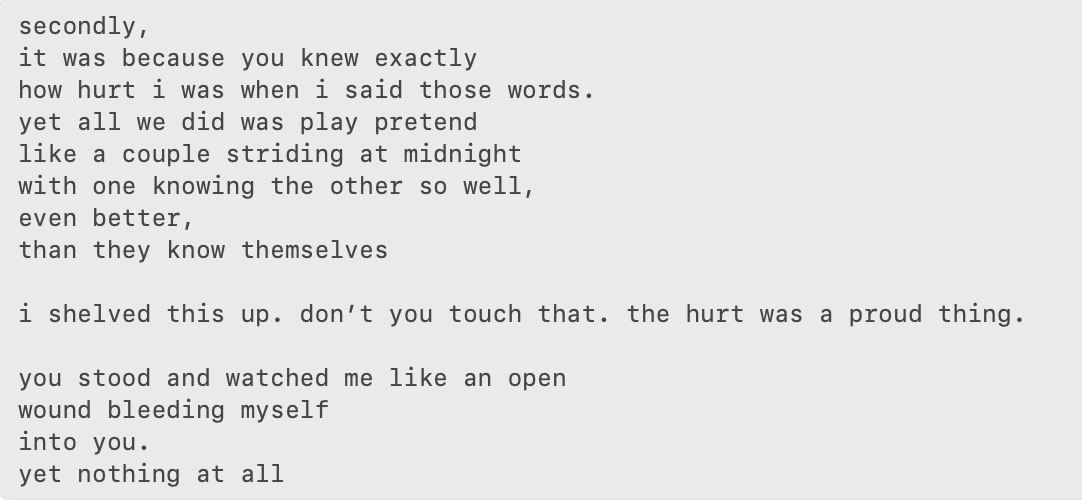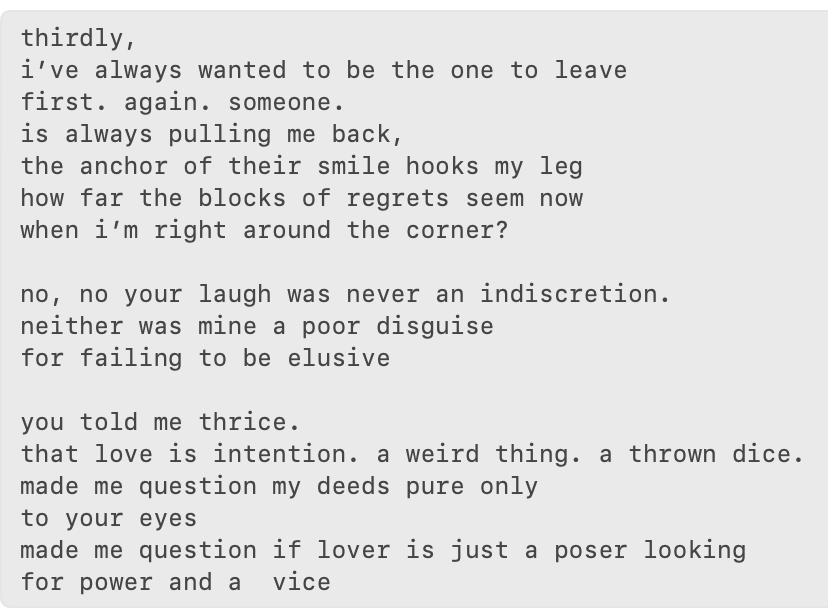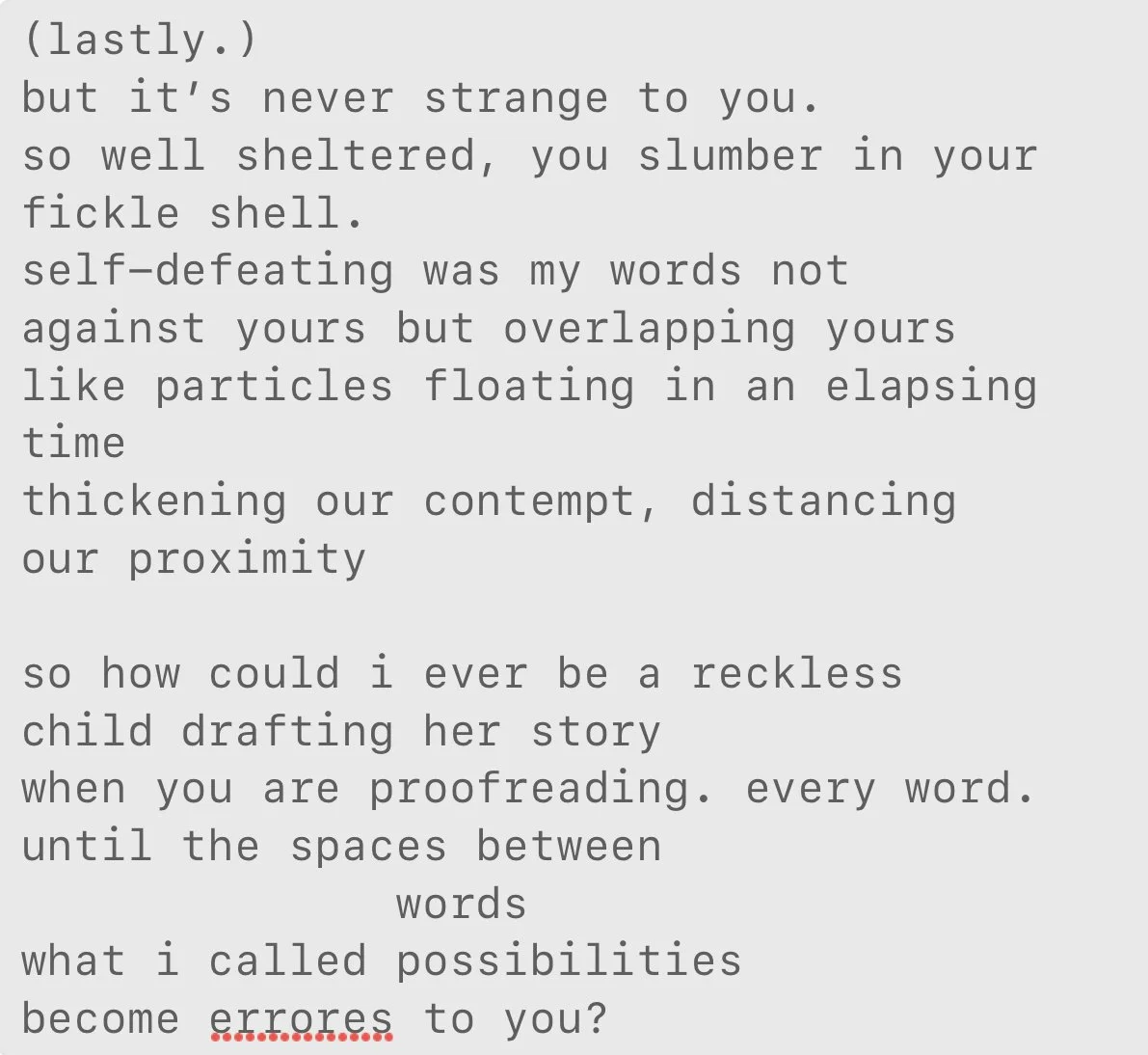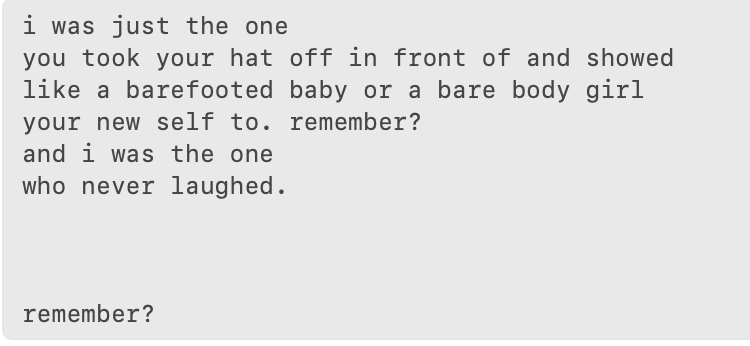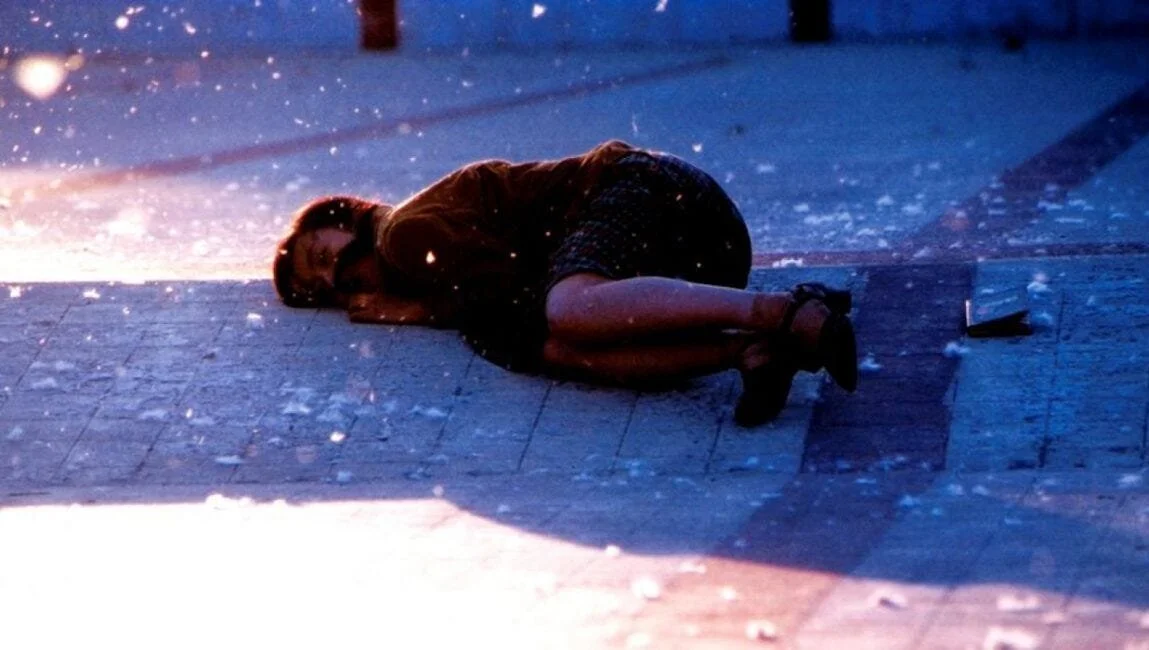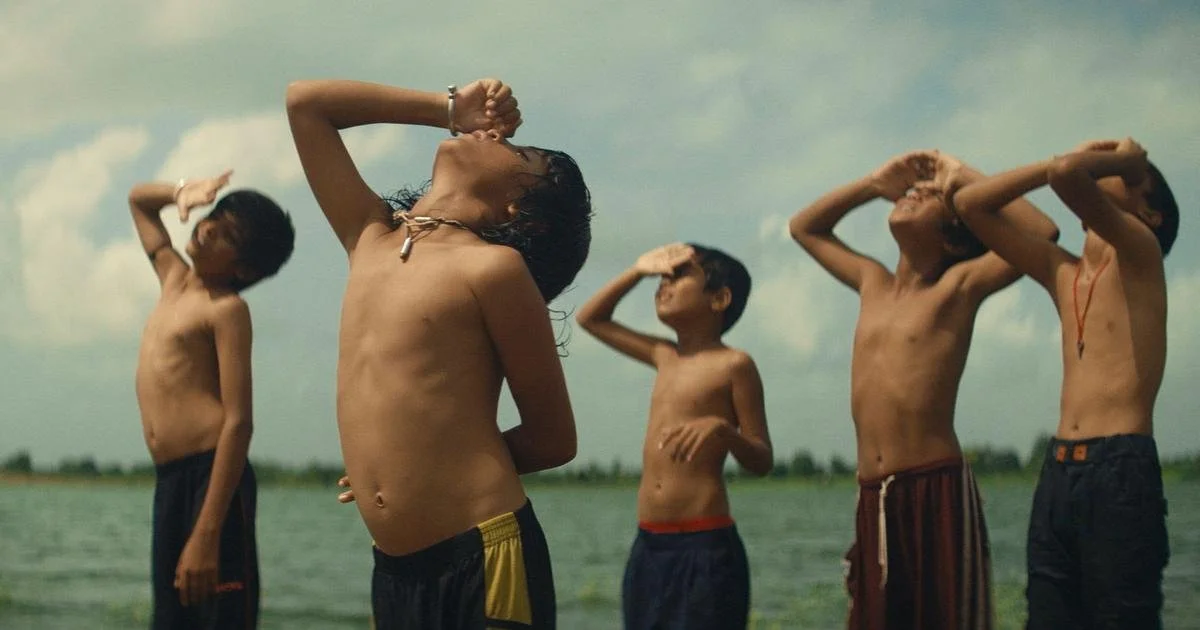-Poetry-
In the previous life, we were numbers. we existed, On the floor,the wall, the minute hand. scale
We woke up to the sum of the world. Sleep in theImprecision of its cruelty. And then return, quietly inviting. yourself to find footsteps on your skin. wake up, Amalgamating to a definity.True, that She miscalculated. March 2025
Numbering
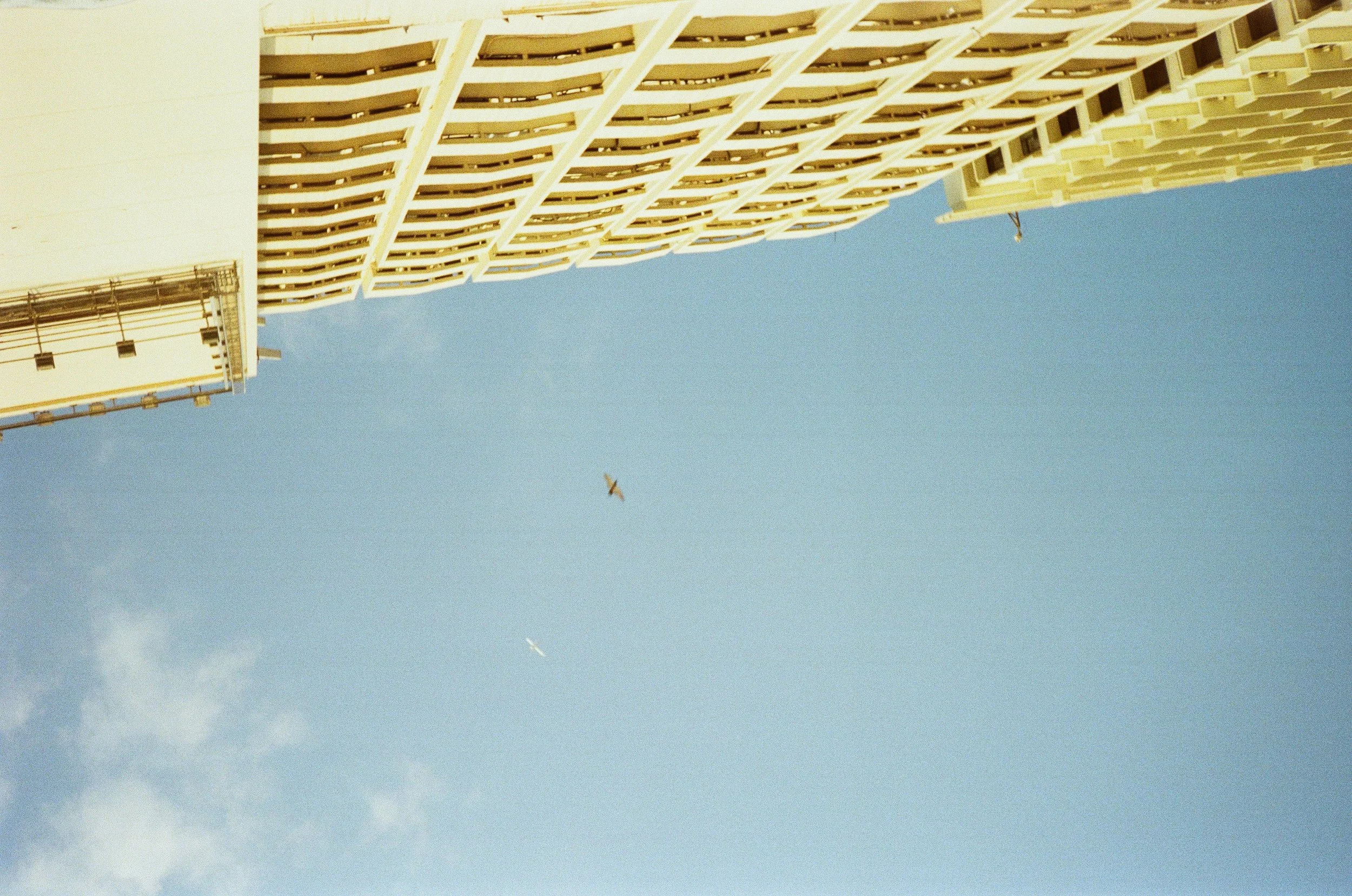
The After Hours
The After Hours hung
Between my teeth
Like a dangling possibility,
A somnambulistic fruit wrestling
With my sensibility.
Packed souls, souls packed
With people, itemized. People, capitalized.
Does becoming different mean to become the same?
Even so,
The after hour accepted
My mistakes
Tattooing my face, almost too sweet, too pretty.
To be praised by strangers, raised by Love and Ease.
“Too bad,”
I told them repeatedly, shrugging off the past you dusted me, “I don’t have that much in me to erase it.”
In reverie I recalled
Sitting in the shallow abyss of its alarming impression,
Drunk in dull eyes and sinking words that soon
Opened up like a canned laughter.
It looked at me,
Like a sharp pain entrapped by beauty,
Its scar decorated by anger
And I, —
Unfolding now, coming undone
A past written with waterproof ink on a metal plate leaking in front of you.
The after hours loved me,
Though I must admit, I have soft words not softly spoken but lurking in a strange retreat
Oh if only I could sharpen
my tongue,
Til it becomes a knife that cuts both ways
Til anger feints with fear
Til fear prevails
In the after hours,
anger is concrete, happiness is the wind
Sailing across a novelty shown
In the way The moon glows, engulfing the beam of the sun.
In the way I tried to outgrow your words.
In the way promises are no longer in convalescence and our laughter soak in melody.
In the after hours, I finally look up, and start to see
Where home is.
The after hours saw me,
More than you ever did. More desperate. More true.
Less scorching.
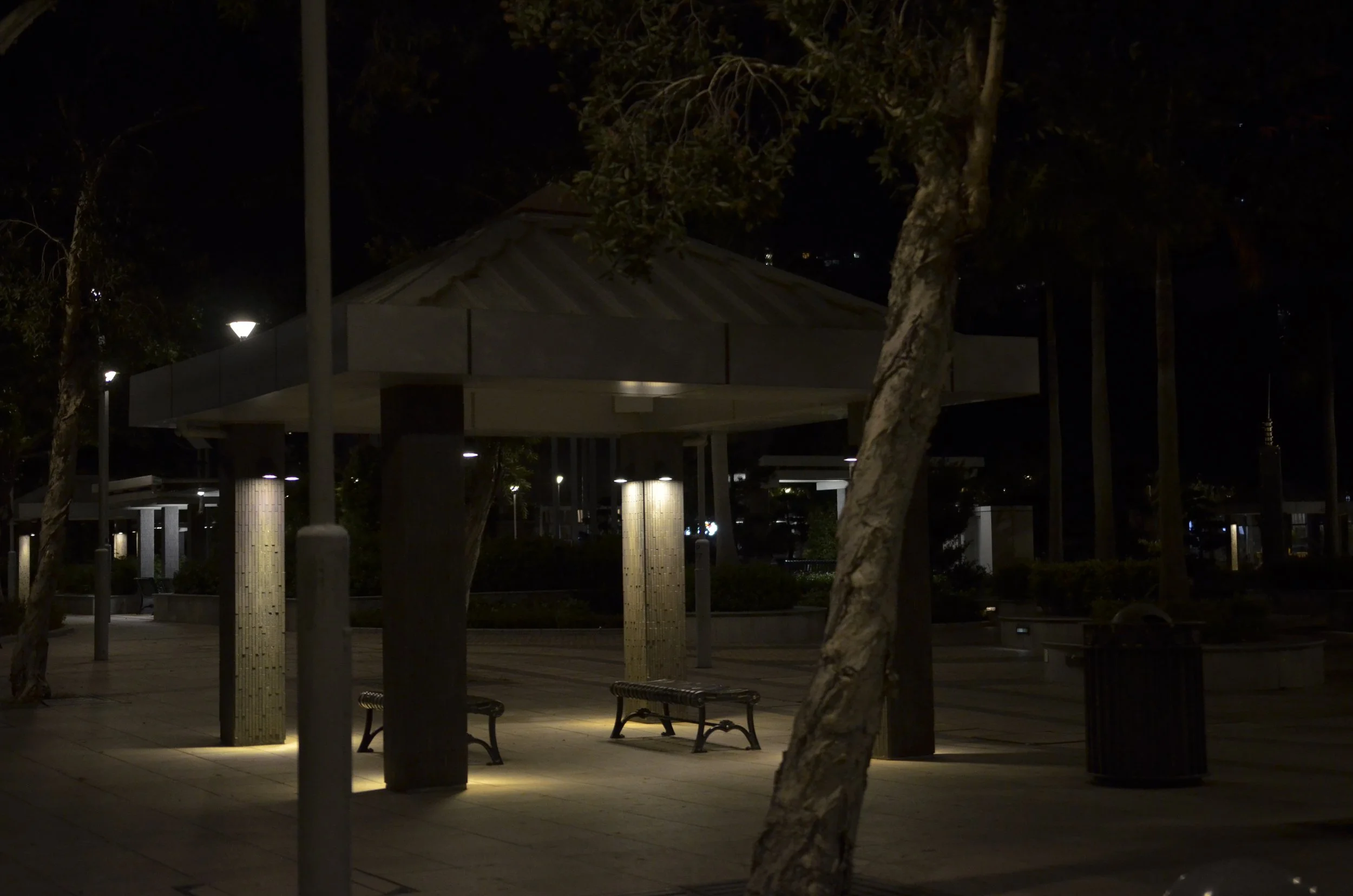
Today I Stood In Front of A Stonewall and Cried
today I stood in front of a stonewall and cried
for somebody else’s sin but not mine
not mine not mine
you stood at the eye
of a needle thinking of mending my brokenness
with your half sewn heart.
reminding me a moment from last night, or
was it our past lives crossing
needles to threads.
in that life, your face was always red
flushed with greediness for life and a hint of blue
in that life, my hair was purple
i didn’t wear glasses and my smile was as bright as it was supposed to be
and i was a cautious lover
you were a reckless loner/ afloat
I’d pull you aside for a dance
and somehow you’d know, always, that i purposely
saved this one for us
in that life, you weren’t a polaroid beside my bed
or a frame from a picture flickering, fondling.
or a film undeveloped
because i’d hear you laugh at the weary world every night, vowing
“that’s where we’re going.”
every time, i’d watch you open
like a thin line of a greater thing
open, like morning light receiving
my crooked voice raging
that “love is not for me.”
in that life, your mother was my mother and mine was yours. we shared the same bed but you let me have the bigger side.
in this world, all world clashes.
all the versions of you stand in front of me
i begged
time for mercy to know you in reverse
that to be selfish, to undo the love you have put on me
to reexperience it again
just to say i met you tomorrow.
yet i still play with my pain in great delight.
you watch me open
like a fresh wound growing on a stonewall
where i’d pray
where i’d see you out in the open, showing
me the cuts on your bare palm
whispering like a new dawn
“come on, let’s go home.”
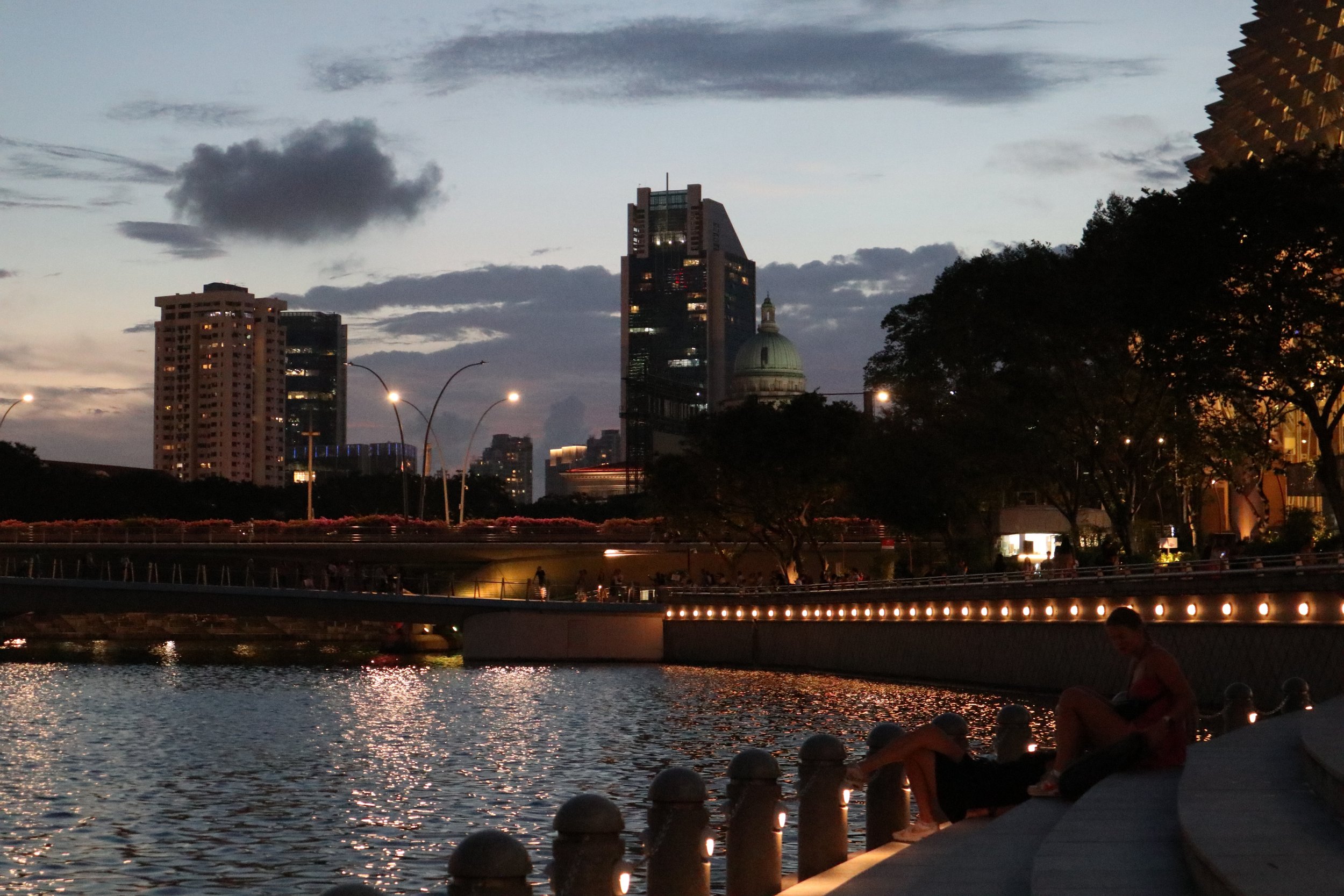
Reasons Why I Looked Unsure:
2024.01.13
Commentary
Split-Ends and Small Violence: Politics of Love in Lou’s “Summer Palace”, Reviewed.
(Hu Lingling as Li Ti) “I want us to break up.”
(Guo Xiaodong) “Why?”
(Hu Lingling as Li Ti) “Because I can’t leave you.”
It is always the brutally raw and the tenderly bare the marks the success of Lou’s artistic directions. Set in 1989, Beijing, the narrative film “Summer Palace” follows four college students struggling to find peace within their interpersonal relationships and their own selves. This anecdotal and fictive backdrop is utilised as a looking glass for Lou to project a similar political turmoil happening within the country of China at that time. Lou’s films are known for their daring expression that push the boundary of conventionality and the so-called “correctness”; using pseudo-documentary cinematography to enhance the verisimilitude for its audience, Lou brings his characters to life. Yet amongst all of his bold attempts, “Summer Palace” is claimed as one of the most controversial films in China and becomes permanently prohibited later on. Not only due to its excessive use of nudity and sex-scenes, but mainly the event that remains unspoken by the many in China- 1989 Tiananmen Square protests and massacre. The tragedy portrayed in “Summer Palace” lies at its characters’ unfiltered attempt to defy tragedy and their search for freedom. The quest of these individuals that weaves loyalty, break as well as ambiguity and reject into one, is a representation of the struggle and difficulty of the intellects in 1989 China. Intellectual affluence results in poverty in the spiritual world and so the desire for love and freedom is directly translated into the blatant conversation of sex and sexual desire.
Their small violence in each other’s interpersonal relationships, such as Li Ti’s suicide and Wei’s sexual awakening and addiction, speaks of a bigger political grudge between China and its people. The 1989 Tiananmen Square protests, other than its brutality and oppression, was a political ultimatum where in its nature, either choice would result in doom. But for every person in China therein contains a passion and perpetual wish for freedom and for a revert of patriotic bond; split-ends, hopefully speaking, are the beginning of healed starts. These fanatically sexual emotions portrayed in Lou’s “Summer Palace” are elastic that stretch over the span of time, so does the political subtext that transcends the interpersonal material.
This could be epitomised by Orwell’s saying, “Their embrace had been a battle, the climax a victory. It was a blow struck against the Party. It was a political act.”
In the time of youth and despair, hope is not completely revoked.
Cinematic and Societal Ambivalence: “Last Film Show” and Its Parallelism
Films are one dominant form of the arts that serve to be the microcosm of society and offer a mirror up to nuanced societal issues. “Last Film Show” directed by Pan Nalin is not an exception.
“Last Film Show”, indeed, in its very title and lack of definite articles, carries a degree of finality and perpetual longing. It tells the tale of a young Gujarati boy, “Samay”, whose passion for films unveils the disparity between his pipe-dream and his society. Yet what makes this film instantaneously captivating is its use of cinematic ambiguity in the denouement. This is a tool to mirror cinematic con, as well as the turmoil of longing and finality. In the denouement, Samay shows his sense of acceptance in the fact that his endearing plastic film reels have been reproduced and made into necklaces and jewelries. He calls out the names of famous directors that complement each color of the jewelry he sees and appears in front of the audience. Nalin underlines that films are a form of reincarnation. Broadly speaking, art itself is the constant rematerialisation of the intangible from the tangible. The ending was cut off halfway coupled with film flares and grains, simulating that we as the audience had been watching a film reel- like the ones rematerialised in the film, in front of Samay. It is with this same cinematic con that the audience experience its cinematic verisimilitude.
As an unjustified parallel to “The Fableman”, this semi-autobiographical film does offer hope, but only to a certain extent. The ending, with a rather mellow undertone, is filled with uncertainty that extends and shares the same outlook on society. This outlook plays a part in shaping individual autonomy and aspirations. Nalin said in an interview that “When you have nothing, nothing can stop you.” Sure, this sounds aspirational, but this film highlights the crucial role of government that constitutes "nothingness". Though this commentary is not targeted at any particular country, the general critique of rising poverty and lack of equal provision is still worth emphasizing. With Samay's uncertain future and impoverished past intertwined with hope, cinematic ambivalence conveys a similar societal ambivalence.
In today's world, are we equipped primarily with prosperity or do we need to reclaim our innate rights? “Last Film Show” is an understatement of an underlying societal issue, not just in India, but in every country where poverty is dire and no choice is ideal, only the lesser of two evils.


